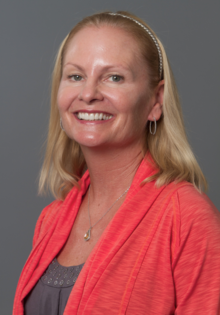The Daily Bulletin is published by Internal and Leadership Communications, part of University Communications
Contact us at bulletin@uwaterloo.ca
Submission guidelines
Editor:
Brandon Sweet
University Communications
bulletin@uwaterloo.ca
 The University of Waterloo has announced new details around the campus memorial for Pearl Sullivan, dean emeritus of the Faculty of Engineering.
The University of Waterloo has announced new details around the campus memorial for Pearl Sullivan, dean emeritus of the Faculty of Engineering.
"To remember and celebrate the incredible contributions made to the University of Waterloo by Pearl Sullivan, former dean of engineering and the first woman to hold the position, we will be hosting an online celebration of her life for our internal University community," President Feridun Hamdullahpur wrote in a memo circulated to campus yesterday. "I hope you will join in this special ceremony as our campus community honours the life and legacy of Professor Sullivan."
The ceremony will take place on Tuesday, January 26 from 11:30 a.m. to 12:00 p.m. on YouTube Live.
Please register to receive more details about the memorial event.
If you are grieving and need support, the following resources are available.
Counselling Services - 519-888-4567 ext. 32655
Here 24/7 - 1-844-437-3247
Health Services - Student Medical Clinic - 519-888-4096
Grand River Hospital - 519-749-4300
St. Mary's Hospital - 519-744-3311
Good2Talk - 1-866-925-5454
Crisis Services Canada - 1-833-456-4566 or by text 45645
Bereavement Ontario Network
Grieving Together Canada
EmpowerMe - 1-833-628-5589
For staff and faculty:
Employee and Family Assistance Program
Occupational Health Nurse
Extended Health Care Benefit for private counselling
UW Chaplains (support all faiths and secular perspectives)

This article was originally published on Waterloo Stories.
Developed by researchers at the University of Waterloo and AI company DarwinAI, the technology enables the creation of low-cost, low-power, self-contained speech recognition software that is tailored to specific tasks.
Unlike existing voice assistant systems such as Amazon Echo and Google Home, the deep-learning AI software could run everything from televisions to thermostats without connections to cloud computing.
“Cost and efficiency are two of the biggest bottlenecks to the widespread adoption of machine-learning AI,” said Alexander Wong, a professor of systems design engineering at Waterloo. “This technology significantly addresses those issues and enables a new class of voice assistants for everyday devices with energy-efficiency needs.”
The breakthrough involves the use of AI algorithms to create AI speech recognition software so compact it can fit on chips that are smaller than postage stamps and cost only a few dollars to make.
That efficiency is achieved by giving AI algorithms data and specific requirements – the ability to understand the words “yes,” “no,” “on” and “off,” for instance – and instructing them to find the least complex way to meet them.
“The resulting software is just big enough to do a particular job well,” said Wong, director of the Vision and Image Processing (VIP) Research Group, and a co-founder of DarwinAI. “That is the goal, the essence of our approach.”
The efficiency and performance of the speech recognition AI are increased by new deep-learning building blocks introduced by Wong’s team. Known as attention condensers, they focus the software on the most relevant information in sound waves.
In addition to home appliances, the compact AI could affordably operate systems in vehicles and devices for people with disabilities, while also helping address privacy concerns associated with cloud-based voice assistants.
Researchers are now working to apply the core technology and their new AI building blocks to the creation of compact, stand-alone AI for visual perception and text interpretation.
A paper on their work, TinySpeech: Attention Condensers for Deep Speech Recognition Neural Networks on Edge Devices, was presented at a recent Neural Information Processing Systems workshop.
Mahmoud Famouri, a researcher at Darwin, Maya Pavlova, a Waterloo engineering student, and Siddharth Surana, a Waterloo computer science student, contributed to the research.

The University of Waterloo's employee and family assistance plan provider, Homewood Health, has some suggestions about combating post-holiday depression.
"The onset of winter typically signifies the beginning of seasonal festivities, family traditions and holidays," says the note from Homewood Health. "This year we face a season of uncertainty, a reprieve of traditions, and social and physical distancing guidelines and mandates to combat the risk of infection and spread of COVID-19. The continuing pandemic in combination with the dynamic changes in weather and a significant decrease in daylight hours can be emotionally overwhelming for many. With the approaching holidays and new year, many individuals are generally on the lookout for a bit of company to help them feel a sense of togetherness and to have some good old fashioned fun with family, friends and colleagues. This year will be different."
"As we approach those celebratory days, people can experience feelings of excitement, anticipation and this year apprehension. There’s typically a lot to do, and in spite of all of our preparations, it seems as if we’re never fully prepared. In previous years, many started planning weeks or even months in advance, as there may have been many invitations or events to attend. As the second wave of COVID-19 continues, these desired occurrences have been either scaled back or cancelled, giving way to feelings of disappointment and in some instances depression. During times of upheaval and unfamiliar routines, these feelings may be intensified or prolonged. In most instances, we take it in stride and generally try to enjoy the time we spend together, in-person or virtually, making new memories and perhaps new traditions. However, as the season draws to an end, a different set of emotions may surface for many individuals, as we realize the year, and celebrations are winding down. It’s in these moments, that post-holiday depression can set in."
"It’s important to recognize that depression is one of the most common mood disorders, and it can have serious and lasting implications on an individual's mental and physical health. Depression is a mental health disorder which makes individuals feel sad or indifferent to many events or scenarios."
Read the rest of the Homewood Health update.

Upkar Arora (BA '85, MAcc '85) understands just how powerful our investments can be. He spoke with the Office of Advancement recently to talk about his work at Rally Assets, an impact investment firm. Plus, he speaks about his personal investments to Waterloo as an alumnus, donor and committed volunteer. Why does he care so deeply about our University community? How does he hope these investments will impact the world? How can others make an impact too?
 The Cheriton School of Computer Science will be hosting Mary Czerwinski, Partner Research Manager at Microsoft Research’s Human Understanding and Empathy Research Group, for a Distinguished Lecture on Thursday, January 14 entitled Using Technology for Health, Wellbeing and Empathy.
The Cheriton School of Computer Science will be hosting Mary Czerwinski, Partner Research Manager at Microsoft Research’s Human Understanding and Empathy Research Group, for a Distinguished Lecture on Thursday, January 14 entitled Using Technology for Health, Wellbeing and Empathy.
Czerwinski will explore how we can create technologies to help us reflect on and change our behaviour, and improve both our health and overall wellbeing at work and at home. She and her team have developed wearable technology to help families manage tense situations with their children, mobile phone-based applications for handling stress and depression, as well as automatic sensing systems for tracking well-being over time.
The latest focus agents she and her team have developed can help with planning and focus and recommend good times to take a break at work. The overarching goal of this research is to develop intelligent systems and agents that work with the user so they can maximize their goals and improve their wellbeing over time. She will also briefly share some information on how academics studying human-computer interaction can work with industrial partners such as Microsoft Research to have greater impact.
To join this Distinguished Lecture Series Presentation on Zoom, please go to https://zoom.us/j/97938109183.
Here's what’s happening at the Centre for Career Action (CCA) this week:
You can see CCA’s full offerings of virtual programming online. Students can register on WaterlooWorks.
CCA virtual drop-in advising hours for November:
Résumé, cover letter, and interview drop-ins for UG and Master's students are offered Monday to Friday, 9:00 a.m. to 10:00 a.m., 12:00 p.m. to 1:00 p.m., and 5:00 p.m. to 6:00 p.m.
Career Consult and work search drop-ins for UG and Master's students are offered Monday to Friday, 9:00 a.m. to 10:00 a.m. and 12:00 noon to 1:00 p.m.
PhD and Postdoc drop-ins are offered Monday to Friday, 12:00 noon to 1:00 p.m.
Further education support can be requested by filling out the Further Education Support Form. Students can book all virtual drop–ins through WaterlooWorks. Online registration begins at 8:30 a.m. daily.
Employers on campus next week hosting employer information sessions include HSBC, Wish, Bloomberg, Capital One | Business, Roche Canada, Travelers Canada, Capital One | Tech, Oliver Wyman, Qualcomm, Accedo, Tribe, CloudNatix, Aviva, Splunk, The Argus Group. Make sure to register through WaterlooWorks and check the calendar for any updates.
Students can visit the Student Success Office online for supports including academic development, international student resources, leadership development, exchange and study abroad, and opportunities to get involved.
Instructors can visit the Keep Learning website to get support on adapting their teaching and learning plans for an online environment.
Updated Course templates are now available within your course in LEARN to help you build and edit your content and assignment pages quickly. Support for Winter 2021 is available.
The following workshops, webinars, and events are offered by the KL team (CTE, CEL, ITMS, LIB):
Independent Remote Course Design Essentials. Self-directed, continuous self-enrollment course in LEARN.
LEARN for TAs (CTE6550), Wednesday, January 13, 10:00 a.m. to 11:30 a.m.
Getting Ready to Facilitate Online Courses: TA Training, Monday, January 18, 8:30 a.m. to Friday, February 12, 4:30 p.m.
LEARN for TAs (CTE6550), Monday, January 18, 1:30 p.m. to 3:00 p.m.
Employees can access resources to help them work remotely, including managing University records and privacy of personal information. Here are some tips for staying healthy while working from home.
Stay informed about COVID cases on campus by consulting the COVID case tracker.
Whether you’re student or faculty, the Writing and Communication Centre has virtual services and programs to help you with your academic writing needs.
We understand that these circumstances can be troubling, and you may need to speak with someone for emotional support. Good2Talk is a post-secondary student helpline based in Ontario, Canada that is available to all students. If you feel overwhelmed or anxious and need to talk to somebody, please contact the University’s Campus Wellness services, either Health Services or Counselling Services. You can also contact the University's Centre for Mental Health Research and Treatment.
The Library has published a resource guide on how to avoid information overload.
The Faculty Association of the University of Waterloo (FAUW) continues to advocate for its members. Check out the FAUW blog for more information.
The University of Waterloo Staff Association (UWSA) continues to advocate for its members. Check out the UWSA blog for more information.
The Waterloo Indigenous Student Centre facilitates the sharing of Indigenous knowledge and provides culturally relevant information and support services for all members of the University of Waterloo community, including Indigenous and non-Indigenous students, staff, and faculty.
WUSA supports for students:
Food Support Service food hampers are currently available from the Turnkey Desk on weekdays from 9:00 a.m. to 4:00 p.m. in the Student Life Centre. If you have any questions please email us at foodsupport@wusa.ca.
Centre for Academic Policy Support - CAPS is here to assist Waterloo undergraduates throughout their experience in navigating academic policy in the instances of filing petitions, grievances and appeals. Please contact them at caps@wusa.ca. More information at https://wusa.ca/services/centre-academic-policy-support-caps.
WUSA Commissioners who can help in a variety of areas that students may be experiencing during this time:
WUSA Student Legal Protection Program - Seeking legal counsel can be intimidating, especially if it’s your first time facing a legal issue. The legal assistance helpline provides quick access to legal advice in any area of law, including criminal. Just call 1-833-202-4571.
Empower Me is a confidential mental health and wellness service that connects students with qualified counsellors 24/7. They can be reached at 1-833-628-5589.
Healthy Warriors at Home. Free programming including Online Fitness, Health Webinars, Personalized Nutrition and more from Warriors Athletics and Rec. Open to students, staff, faculty and alumni. Register today.
Renison English Language Institute continues to offer virtual events and workshops to help students practice their English language skills.
Warriors vs. Laurier Blood Donation Battle. Join your fellow Warriors, donate blood and help us win the Blood Battle against Laurier for a second year in a row. Set up a profile or add the PFL code: UNIV960995 to your account if you have a blood.ca account already. Questions? Contact WarriorsInfo@uwaterloo.ca.
Warrior Reset, January 11 to February 4. Free online program with three live fitness classes per week along with tips, tricks and worksheets to help you define your path to better health while being part of an online community. Register by January 10.
Engineering Undergraduate Admissions Webinar Series: Admissions tips & tricks, Wednesday, January 13 and Thursday, January 14.
Distinguished Lecture Series: Using Technology for Health, Wellbeing and Empathy, Mary Czerwinski, Partner Research Manager at Microsoft Research’s Human Understanding and Empathy Research Group, Thursday, January 14, 1:00 p.m.
Mathematics presents Virtual Networking in Academia, Monday, January 18, 9:30 a.m.
University senate meeting, Monday, January 18, 3:30 p.m.
More Feet on the Ground Mental Health Training for Faculty and Staff, Tuesday, January 19, 9:30 a.m.
Benefits plan information sessions, Tuesday, January 19, 10:00 a.m. to 11:00 a.m. and 6:00 p.m. to 7:00 p.m. Register online.
NEW - Launching a Waterloo chapter of the Canadian Indigenous Science and Engineering Society, Tuesday, January 19, 12:00 p.m.
NEW - Portfolio & Project Management Community of Practice (PPM CoP) session, "Project Management Community at uWaterloo in 2021" Wednesday, January 20, 9:00 a.m. to 10:00 a.m. Register for this event.
Benefits plan information sessions, Wednesday, January 20, 12 noon to 1:00 p.m. and 3:30 p.m. to 4:30 p.m. Register online.
Master of Taxation Virtual Information Session, Saturday, January 23, 9:00 a.m. to 10:00 a.m. Register at www.mtax.ca.
On this week's list from the human resources department, viewable on the UWaterloo Talent Acquisition System (iCIMS):
Secondments/Internal temporary opportunities
The Daily Bulletin is published by Internal and Leadership Communications, part of University Communications
Contact us at bulletin@uwaterloo.ca
Submission guidelines
The University of Waterloo acknowledges that much of our work takes place on the traditional territory of the Neutral, Anishinaabeg, and Haudenosaunee peoples. Our main campus is situated on the Haldimand Tract, the land granted to the Six Nations that includes six miles on each side of the Grand River. Our active work toward reconciliation takes place across our campuses through research, learning, teaching, and community building, and is co-ordinated within the Office of Indigenous Relations.